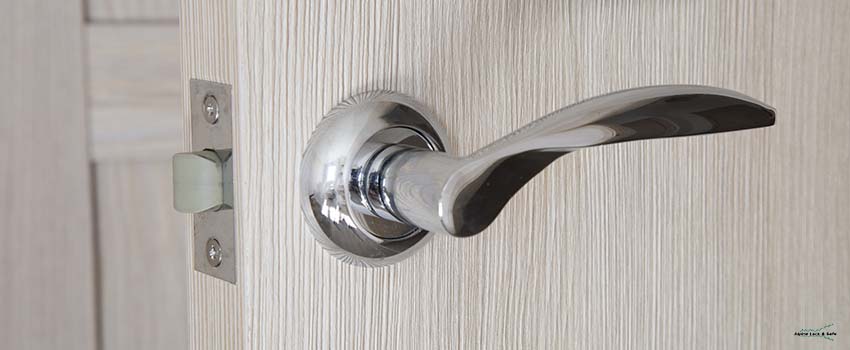Security matters require people to be more vigilant, creative, and prudent to avoid lockout situations and ensure the safety of their properties.
The changing weather is a surprising cause of lock issues. Due to fluctuating temperatures, residential and commercial locks can jam or fail to work. Most of the time, people overlook their doors or car locks until they don’t work the way they should.
Alpine Lock & Safe is here to answer your questions about the connection between your door locks and weather changes. Learn how to maintain your security no matter the season.
How Weather Changes Can Affect Summer House Door Locks
Extreme temperatures during summer or winter can significantly impact your home or vehicle’s door locks. The lock can break or be difficult to turn. The locking mechanism could fail, and you might not be able to insert the key at all.
Let’s examine how extreme weather conditions can affect locks:
Hot Weather
High humidity in summer can cause excessive moisture, particularly for exterior wood doors. Rising temperatures expand the door and warp the wood around the lock, making it difficult to turn.
Heat also expands plastic doors, causing them to jam in their frames and become difficult to close. You can solve this problem by waiting until the door cools off. However, you can shield the door and the outdoor lock from direct sunlight, providing sufficient ventilation and preventing heat from building up.
Metal door locks and uPVC mechanisms suffer in the heat. Their lubricant evaporates, and metal parts expand, causing the lock and mechanism to get stuck and prevent it from being used.
While careful lubricant application can reduce the risk, there is not much you can do if the door has expanded. You have to wait for it to cool off and shrink. If this persists, it might be worth looking at how to shade your door to prevent it from happening again.
Cold Weather
Cold temperatures can freeze or thicken your door’s lubricant, which allows the metal parts to move smoothly together. It also causes metal to shrink or become brittle.
Water in your locks can also freeze and expand, preventing parts from moving and causing damage to the lock structure. It may also block the keyway and make it impossible for you to insert the key.
Here are solutions you can try: First, protect your summer house door locks against the elements as much as possible. Second, warm the key gently to melt ice or soften the lubricant. Remember to proceed with caution as metal can quickly heat up.
How Temperature Changes Affect Different Types of Door Locks
Here’s how changing temperatures affect different types of door locks:
1. Vehicle Locks
Locks for a car can become very sensitive to cold temperatures. If temperatures drop below freezing, moisture inside the lock may freeze, making it impossible to turn the lock or prevent remote door openers from working.
In most situations, heating the key using an open flame before inserting it into the lock will resolve the problem. If your car has a remote-start, let the engine run for several minutes to warm up your car. The locks will eventually unfreeze and work again.
2. Keyless Locks
Keyless locks are becoming more popular in the business sector due to their convenience and security features. They don’t suffer from the same problems as standard locks during heatwaves or cold snaps.
However, weather can still affect keyless locks in some way. They may experience:
- Mechanical Issues: Most “all-weather keyless door locks” are not affected by water, rain, or snow. However, they may still not work well under extreme pressures.
- Battery Drain: Like cell phone batteries, prolonged exposure to cold temperatures cause shorter life spans in a keyless door lock car.
3. Padlocks
Although this type of lock is not as common as others, you can use it to secure fences, sheds, and garages. If these locks contain moisture, they can freeze, making them more challenging to unlock.
4. Deadbolts
The lock mechanism should retract when keys are placed and twisted. It also needs to extend when it is locked. If the lock is warm or hot, it might become difficult to turn or impossible to lock. Sometimes the heat may warp the door and affect the lock’s functionality.
4 Preventive Measures to Protect Locks From Weather Changes
Here are some steps to take to prevent issues with your door locks:
1. Hire professional locksmiths.
When you want to upgrade your locks, make sure you hire a skilled locksmith. They will ensure that the lock fits the door frame and reduce problems due to changing weather conditions.
2. Replace wooden door frames and exterior doors.
Consider replacing exterior door frames made of wood with stronger, more weather-resistant options. There are many options available, including steel, fiberglass, and aluminum.
3. Oil door hinges and bolts regularly.
Make sure to oil your door locks every once in a while; it will make it easier to turn even when the weather changes. Make sure to remove the lock before applying lubricants.
4. Keep your locks dry.
Make sure the lock is dry. Keep snow and rain away from the lock by ensuring overhangs, gutters, and eaves provide sufficient coverage.
When to Call a Locksmith
Extreme cold or hot temperatures can make it difficult to operate locks in your home or work. It’s best to leave the job to a professional locksmith; they’ll make sure to properly fix your locks and provide top-notch solutions to your problems. They may need to be re-fitted within their frame or remove the entire door and modify it to make it fit perfectly.
If your locks are stuck shut, contact a locksmith immediately. Do-it-yourself fixes might further damage your locks.
Choose Alpine Lock & Safe for Your Locks
Alpine Lock & Safe provides top-notch locksmith services.
Avoid lockouts and break-ins with the right people. Our automotive locksmith in Vail, CO, is ready to help if the weather changes affect your car door locks. Call us today!






